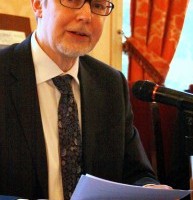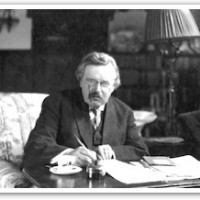The Crisis of Fatherhood, by Stratford Caldecott
The Winter 2013 issue of Humanum, the freely available online journal of the Pope John Paul II Institute for Studies on Marriage and Family in Washington, DC (or rather the Institute’s Center for Pastoral and Cultural Research) is devoted to the crisis of fatherhood in our culture. It contains articles and book reviews devoted to the literature on this topic. (The following notes are based on the Editorial for the issue.)
The collapse of marriage in the developed world is happening faster than many believed possible. Civil marriages exceed religious ones, and both are in steep decline. In Italy, the heartland of Catholicism, where the largest religious institution on earth might be expected to have some influence, there are only 3.6 marriages a year for every thousand inhabitants, compared to 4.7 for the European Union as a whole—in the wealthy parts of Italy the numbers are even lower. Clearly most couples now do not get married. Single parents, especially single mothers, are commonplace. Given that it is hard enough for a stable, loving couple to bring up a child, or children, the difficulties faced by single parents are formidable.
The recovery of fatherhood is not merely a political and sociological challenge, to be met by strengthening the legislation that keeps families together, deters separation, and insists that a man takes more responsibility for his children (whether he be married or not). What needs to be recovered is a vision, a sense of responsibility, something the philosopher Gabriel Marcel in his book Homo Viator (1951) called a “creative vow”.
The father is more than a biological instrument above all when he is prepared to consecrate himself for a role that transcends the physical. He gives of himself biologically to the mother when the child is conceived; but he gives of himself spiritually when he accepts a continuing and indeed eternal responsibility for the gift that God gives him in return—the gift of the child whom he did not fashion and whose destiny he cannot determine or control.
No longer the primary breadwinner, today’s father is not even necessarily the one who engendered his own child, thanks to the wonders of IVF. Technology, which already in the 1960s severed the connection between sex and reproduction, now promises to separate gender from parenthood entirely. It is hardly surprising that so many fathers are missing from the landscape of the contemporary family.
In the current issue of Humanum Nicholas J. Healy concludes:
“It is tempting to cover the wounds that result from an absent father or from an abusive father by diminishing the significance of fatherhood. But this forgetfulness of origins leads to a greater loneliness and metaphysical confusion. A more promising path is to reflect more deeply on the hidden Fatherhood of God that undergirds and encompasses every human origin no matter how broken.”
Read the complete article in The Imaginative Conservative
La France meurt de l’hégémonie marxiste, by Guy Milliere
Voici une dizaine de jours, c’était le premier anniversaire de la présidence de François Hollande. Triste anniversaire.
Ceux qui voudraient mettre quoi que ce soit à l’actif du « Président normal » auraient bien des difficultés à trouver quoi citer. L’endettement du pays continue à se creuser. Les chiffres du chômage poursuivent leur ascension. Les pauvres se multiplient, comme toujours lorsque les socialistes sont au pouvoir. Les projets fiscaux les plus ineptes énoncés lors de la campagne électorale n’ont pas vu le jour, mais la fiscalité ne s’en est pas moins trouvée alourdie. L’ombre de la duplicité et de l’hypocrisie, qui s’est déployée avec l’affaire Cahuzac, ne cesse de projeter ses effets de délégitimation.
C’est sur ce fonds malsain que se sont déroulé les manifestations contre la seule « réforme » que François Hollande ait vraiment menée jusqu’au bout : celle du mariage.
La dimension de destruction de la famille qui s’y love a suscité un vaste mouvement de rejet qui n’aurait sans doute pas acquis cette ampleur s’il n’avait pris appui sur une inquiétude plus large.
En sa grande majorité, la population française perçoit que le pays est en déclin et que le déclin s’accentue jusqu’à ressembler à une maladie en phase terminale.
La perception du déclin, visible dans tous les sondages, s’accompagne d’un désarroi, d’une angoisse, d’une dépression collective tout à fait explicables.
Sans doute parce que nous sommes au printemps, certains ont vu dans les réactions de désarroi, d’angoisse et de dépression collective les traces d’un « printemps français ». J’aimerais penser qu’ils ont raison, mais je dois dire que je suis circonspect.
Il ne se dessine, en effet, aucun sursaut, aucune esquisse de perspective.
Les gens de gauche pensent, pour la plupart, que François Hollande n’est pas assez à gauche, autrement dit qu’il n’a pas été assez loin dans la progressivité fiscale, et ils sont plus que jamais enferrés dans la débilité envieuse qui les conduit à considérer qu’il suffit de s’en prendre aux plus entreprenants pour que tout aille mieux. Nombre de gens de droite sont porteurs de propositions teintées des mêmes idées stupides.
Les explications de l’évolution économique planétaire, des paramètres de la globalisation, de la croissance qui se poursuit ailleurs sur la planète, et qui ne déserte que le continent européen, sont absentes.
Le vieillissement accéléré que connaît l’Europe, les incitations qui sous-tendent les flux migratoires complexes qui strient celle-ci et en font fuir les porteurs de capital intellectuel, ne sont jamais évoqués.
La France, comme une part majeure du continent européen, est soumise au règne absolu d’une hégémonie marxiste, anticipée par le communiste italien Antonio Gramsci dans les années 1930. Gramsci pensait que le capitalisme, dans la première moitié du XXe siècle, était en position hégémonique. Il préconisait une longue marche des adeptes du dogme marxiste dans toutes les institutions, jusqu’à ce que l’hégémonie capitaliste soit remplacée par une autre hégémonie, marxiste celle-là.
Il précisait que, lorsque cette hégémonie marxiste serait en place, une irréversibilité serait atteinte. Tous les débats alors, disait-il, auraient lieu au sein de l’hégémonie marxiste ainsi instaurée et sur son horizon. Toute possibilité de raisonner à l’extérieur de l’hégémonie marxiste serait condamnée à être marginalisée. Des mouvements de colère contre l’hégémonie marxiste instaurée pourraient encore exister, mais ils ne pourraient plus se doter des paramètres indispensables pour constituer une alternance.
Read the complete article in Les 4 Vérités
G. K. Chesterton: It’s Not Gay, and It’s Not Marriage, by Dale Ahlquist
One of the pressing issues of Chesterton’s time was “birth control.” He not only objected to the idea, he objected to the very term because it meant the opposite of what it said. It meant no birth and no control. I can only imagine he would have the same objections about “gay marriage.” The idea is wrong, but so is the name. It is not gay and it is not marriage.
Chesterton was so consistently right in his pronouncements and prophecies because he understood that anything that attacked the family was bad for society. That is why he spoke out against eugenics and contraception, against divorce and “free love” (another term he disliked because of its dishonesty), but also against wage slavery and compulsory state-sponsored education and mothers hiring other people to do what mothers were designed to do themselves. It is safe to say that Chesterton stood up against every trend and fad that plagues us today because every one of those trends and fads undermines the family. Big Government tries to replace the family’s authority, and Big Business tries to replace the family’s autonomy. There is a constant commercial and cultural pressure on father, mother, and child. They are minimized and marginalized and, yes, mocked. But as Chesterton says, “This triangle of truisms, of father, mother and child, cannot be destroyed; it can only destroy those civilizations which disregard it.”
This latest attack on the family is neither the latest nor the worst. But it has a shock value to it, in spite of the process of de-sensitization that the information and entertainment industries have been putting us through the past several years. Those who have tried to speak out against the normalization of the abnormal have been met with “either slanging or silence,” as Chesterton was when he attempted to argue against the faddish philosophies that were promoted by the major newspapers in his day. In 1926, he warned, “The next great heresy will be an attack on morality, especially sexual morality.” His warning has gone unheeded, and sexual morality has decayed progressively. But let us remember that it began with birth control, which is an attempt to create sex for sex’s sake, changing the act of love into an act of selfishness. The promotion and acceptance of lifeless, barren, selfish sex has logically progressed to homosexuality.
Chesterton shows that the problem of homosexuality as an enemy of civilization is quite old. In The Everlasting Man, he describes the nature-worship and “mere mythology” that produced a perversion among the Greeks. “Just as they became unnatural by worshipping nature, so they actually became unmanly by worshipping man.” Any young man, he says, “who has the luck to grow up sane and simple” is naturally repulsed by homosexuality because “it is not true to human nature or to common sense.” He argues that if we attempt to act indifferent about it, we are fooling ourselves. It is “the illusion of familiarity,” when “a perversion become[s] a convention.”
Read the complete article in Crises Magazine


